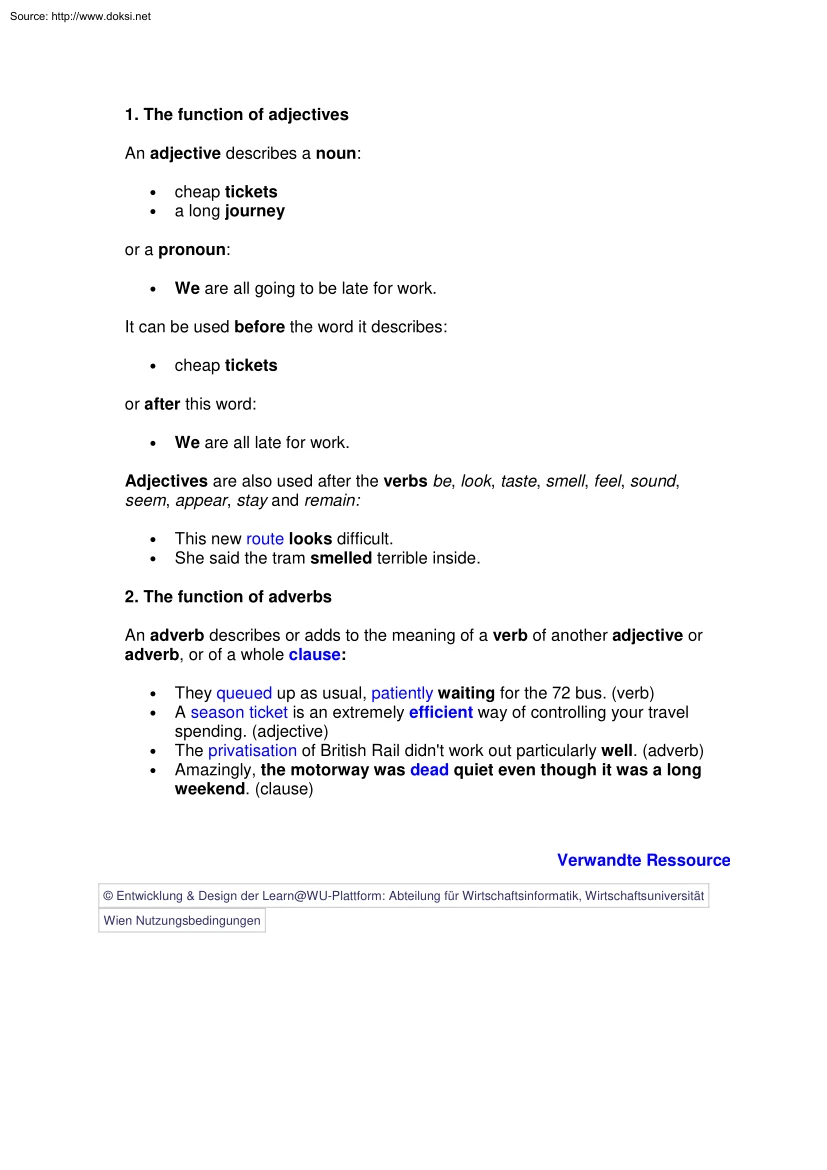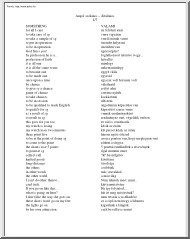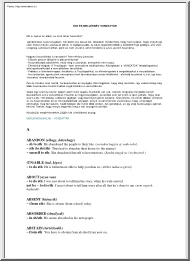Datasheet
Year, pagecount:2012, 4 page(s)
Language:English
Downloads:11
Uploaded:March 25, 2019
Size:473 KB
Institution:
-
Comments:
Attachment:-
Download in PDF:Please log in!
Comments
No comments yet. You can be the first!Most popular documents in this category
Content extract
Source: http://www.doksinet 1. The function of adjectives An adjective describes a noun: • • cheap tickets a long journey or a pronoun: • We are all going to be late for work. It can be used before the word it describes: • cheap tickets or after this word: • We are all late for work. Adjectives are also used after the verbs be, look, taste, smell, feel, sound, seem, appear, stay and remain: • • This new route looks difficult. She said the tram smelled terrible inside. 2. The function of adverbs An adverb describes or adds to the meaning of a verb of another adjective or adverb, or of a whole clause: • • • • They queued up as usual, patiently waiting for the 72 bus. (verb) A season ticket is an extremely efficient way of controlling your travel spending. (adjective) The privatisation of British Rail didnt work out particularly well. (adverb) Amazingly, the motorway was dead quiet even though it was a long weekend. (clause) Verwandte Ressourcen
Entwicklung & Design der Learn@WU-Plattform: Abteilung für Wirtschaftsinformatik, Wirtschaftsuniversität Wien Nutzungsbedingungen Source: http://www.doksinet in good health: • c. "How are you?" - "Quite well, thanks." Consonant + -y If the adjective ends in a consonant+ y, y changes to i: • • d. Travelling by tube in London was easy. I can easily make the trip in two days. a . way If you want to use adjectives that end in -ly (e.g friendly, ugly, lovely) as adverbs, you have to use in a . way / manner / fashion: • e. He explained how the ticket machine worked in a friendly way. Adverb same as adjective Some adjectives can be used as adverbs without adding-ly: • • Shes a hard worker. She works hard Other examples include: better, best, direct, early, fast, free, hard, high, late, long, short, straight, worse, worst Comparison of adverbs Some of these adverbs have a different meaning if you add -ly: • • • • I have hardly
been in the office all week. (very rarely) Have you been to Manchester lately? (recently) I can highly recommend it. (very much) Our dogs can move around freely all day. (without restriction) We use the comparative and superlative forms to compare the same quality of different things: • • . Air transport is much faster than road transport, but road carriage is more convenient . (comparative) Concorde is without doubt the fastest passenger plane in the world. It is also the most expensive way to cross the Atlantic. (superlative) Short adjectives Adjectives with only one syllable (e.g soft, tall) count as short adjectives and form their comparatives and superlatives like this: fast faster fastest Exceptions: one-syllable adjectives ending in -ed, (e.g pleased), as well as the adjectives real, right and wrong, which work like long adjectives (2). Source: http://www.doksinet In adjectives of one vowel ending with a consonant (e.g big, hot, thin) the consonant is doubled:
big 2. bigger biggest Long adjectives Most two-syllable adjectives count as long (e.g careful, helpless, boring, amused, afraid, certain, correct): careful more careful most careful Exceptions: adjectives ending (1) in -y or -le usually work like short adjectives (e.g happy, simple) pretty happy simple likely prettier happier simpler likelier prettiest happiest simplest likeliest Some adjectives can work like short or long adjectives (e.g quiet, tired, clever): quiet quieter/more quiet quietest/most quiet Adjectives of three or more syllables count as long (e.g difficult, beautiful): difficult more difficult most difficult Exceptions:unhappy, unlikely, etc. (3 syllables) work like happy, likely, etc (ie like short adjectives): unhappy unhappier unhappiest unlikely unlikelier unlikeliest Comparison of adjectives ending in -Y or -LE 3. Irregular adjectives: good bad far old 4. better worse farther/further older/elder best worst farthest/furthest
oldest/eldest Adverbs Normally the comparative and superlative of adverbs are formed with more and most, like with long adjectives (2): • • He found the address more easily with a map. You can most easily reach me by mobile when Im on the road. A few adverbs work like short adjectives (1), taking -er and -est to form comparatives and superlatives (e.g fast, soon, early, late, hard, long, well, near) • Could you leave earlier? Source: http://www.doksinet • 5. The longest she could drive without stopping was 8 hours. Irregular adverbs badly well little much 6. worse better less more worst best least most These words can be used to compare quantities Nouns in the plural Uncountable nouns few - fewer - fewest little - less - least fewer (a smaller number) less (a smaller amount) There are fewer motorcyclists in winter. Bus drivers earn less (money) than conductors. fewest (the smallest number) Last year saw the fewest accidents on the roads. least (the
smallest amount) Cyclists are in least danger on cycle paths. many - more - most much - more - most more More a larger number men get a company car than women. more (the largest number) accidents happen as a result of fast and undisciplined driving. most Most most Most a larger amount) He needs more time to get there (the largest amount) traffic information is inaccurate. Uncountable nouns MUCH - LITTLE / MANY - FEW 7. Other constructions used for comparing • • • • • Tourists were less affected by the new regulation than residents were. Children were least affected of all. (Less and least are the opposite of more and most.) The boat tickets were as expensive as the taxi. (the same) BUT: The weather today is warmer than yesterday. (Not the same - do not use as here!) The passengers were getting more and more nervous. (increasingly nervous) Were moving more and more slowly. (increasingly slowly) The older I get, the slower I become. The more dangerous it is, the
more I like it. (I like it more if it is more dangerous) His car is much older than mine. Youre a far better driver than I am. (Far and much can modify a comparative)
Entwicklung & Design der Learn@WU-Plattform: Abteilung für Wirtschaftsinformatik, Wirtschaftsuniversität Wien Nutzungsbedingungen Source: http://www.doksinet in good health: • c. "How are you?" - "Quite well, thanks." Consonant + -y If the adjective ends in a consonant+ y, y changes to i: • • d. Travelling by tube in London was easy. I can easily make the trip in two days. a . way If you want to use adjectives that end in -ly (e.g friendly, ugly, lovely) as adverbs, you have to use in a . way / manner / fashion: • e. He explained how the ticket machine worked in a friendly way. Adverb same as adjective Some adjectives can be used as adverbs without adding-ly: • • Shes a hard worker. She works hard Other examples include: better, best, direct, early, fast, free, hard, high, late, long, short, straight, worse, worst Comparison of adverbs Some of these adverbs have a different meaning if you add -ly: • • • • I have hardly
been in the office all week. (very rarely) Have you been to Manchester lately? (recently) I can highly recommend it. (very much) Our dogs can move around freely all day. (without restriction) We use the comparative and superlative forms to compare the same quality of different things: • • . Air transport is much faster than road transport, but road carriage is more convenient . (comparative) Concorde is without doubt the fastest passenger plane in the world. It is also the most expensive way to cross the Atlantic. (superlative) Short adjectives Adjectives with only one syllable (e.g soft, tall) count as short adjectives and form their comparatives and superlatives like this: fast faster fastest Exceptions: one-syllable adjectives ending in -ed, (e.g pleased), as well as the adjectives real, right and wrong, which work like long adjectives (2). Source: http://www.doksinet In adjectives of one vowel ending with a consonant (e.g big, hot, thin) the consonant is doubled:
big 2. bigger biggest Long adjectives Most two-syllable adjectives count as long (e.g careful, helpless, boring, amused, afraid, certain, correct): careful more careful most careful Exceptions: adjectives ending (1) in -y or -le usually work like short adjectives (e.g happy, simple) pretty happy simple likely prettier happier simpler likelier prettiest happiest simplest likeliest Some adjectives can work like short or long adjectives (e.g quiet, tired, clever): quiet quieter/more quiet quietest/most quiet Adjectives of three or more syllables count as long (e.g difficult, beautiful): difficult more difficult most difficult Exceptions:unhappy, unlikely, etc. (3 syllables) work like happy, likely, etc (ie like short adjectives): unhappy unhappier unhappiest unlikely unlikelier unlikeliest Comparison of adjectives ending in -Y or -LE 3. Irregular adjectives: good bad far old 4. better worse farther/further older/elder best worst farthest/furthest
oldest/eldest Adverbs Normally the comparative and superlative of adverbs are formed with more and most, like with long adjectives (2): • • He found the address more easily with a map. You can most easily reach me by mobile when Im on the road. A few adverbs work like short adjectives (1), taking -er and -est to form comparatives and superlatives (e.g fast, soon, early, late, hard, long, well, near) • Could you leave earlier? Source: http://www.doksinet • 5. The longest she could drive without stopping was 8 hours. Irregular adverbs badly well little much 6. worse better less more worst best least most These words can be used to compare quantities Nouns in the plural Uncountable nouns few - fewer - fewest little - less - least fewer (a smaller number) less (a smaller amount) There are fewer motorcyclists in winter. Bus drivers earn less (money) than conductors. fewest (the smallest number) Last year saw the fewest accidents on the roads. least (the
smallest amount) Cyclists are in least danger on cycle paths. many - more - most much - more - most more More a larger number men get a company car than women. more (the largest number) accidents happen as a result of fast and undisciplined driving. most Most most Most a larger amount) He needs more time to get there (the largest amount) traffic information is inaccurate. Uncountable nouns MUCH - LITTLE / MANY - FEW 7. Other constructions used for comparing • • • • • Tourists were less affected by the new regulation than residents were. Children were least affected of all. (Less and least are the opposite of more and most.) The boat tickets were as expensive as the taxi. (the same) BUT: The weather today is warmer than yesterday. (Not the same - do not use as here!) The passengers were getting more and more nervous. (increasingly nervous) Were moving more and more slowly. (increasingly slowly) The older I get, the slower I become. The more dangerous it is, the
more I like it. (I like it more if it is more dangerous) His car is much older than mine. Youre a far better driver than I am. (Far and much can modify a comparative)





 When reading, most of us just let a story wash over us, getting lost in the world of the book rather than paying attention to the individual elements of the plot or writing. However, in English class, our teachers ask us to look at the mechanics of the writing.
When reading, most of us just let a story wash over us, getting lost in the world of the book rather than paying attention to the individual elements of the plot or writing. However, in English class, our teachers ask us to look at the mechanics of the writing.